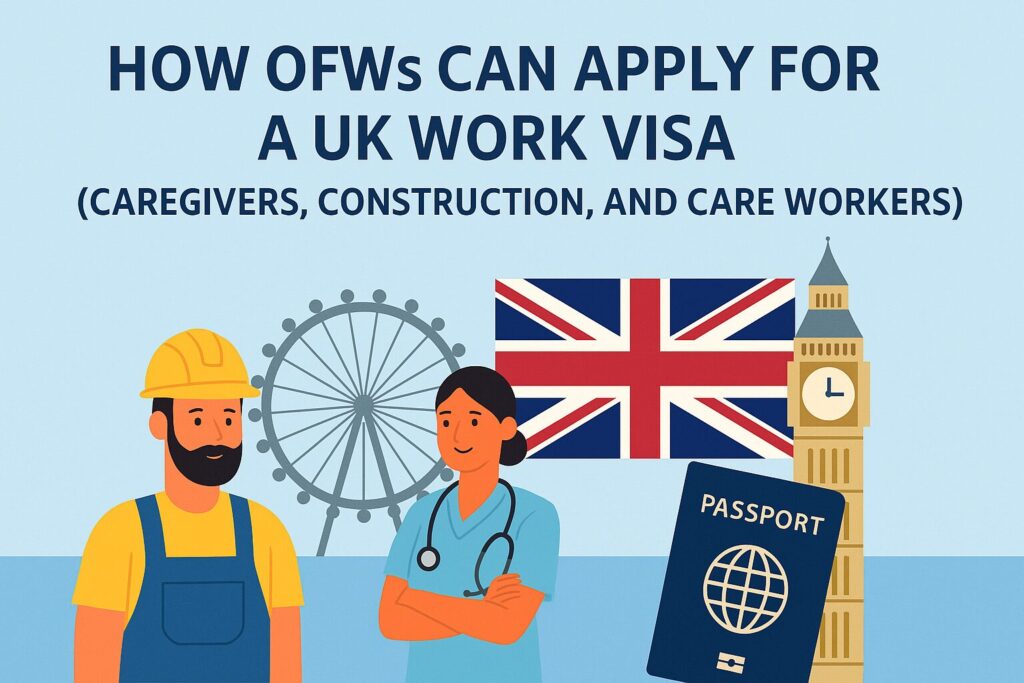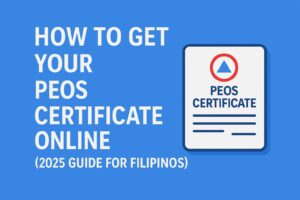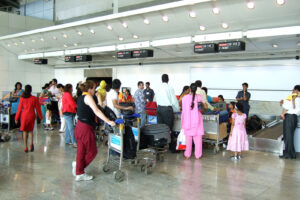How OFWs Can Apply for a UK Work Visa (Caregivers, Construction, and Care Workers)
Mga Overseas Filipino Workers (OFWs) na nais magtrabaho sa United Kingdom – kung ikaw man ay caregiver o skilled worker – kailangan pagdaanan ang proseso ng UK work visa.
Ang guide na ito ay magbibigay ng info tungkol sa mga visa types, step-by-step na proseso, mga requirements, sahod, timeline, at mga gastusin. Kasama rin ang mga agencies/employers na naghahanap ng mga workers sa mga larangang ito. Tatalakayin din natin ang mga labor agreements ng Pilipinas at UK na pwedeng maka-apekto sa journey mo. Tara, simulan na natin!
UK Work Visa Options for Caregivers and Construction Workers
Skilled Worker Visa (formerly Tier 2)
The primary route for most OFWs in caregiving, care work, or construction is the Skilled Worker Visa. This visa requires a job offer from a UK employer with a sponsor license. It covers a broad range of occupations, from nurses and caregivers to tradespeople like carpenters and bricklayers. Importantly, roles on the UK’s Shortage Occupation List (now called the Immigration Salary List) enjoy relaxed requirements – employers can pay 80% of the usual going rate and applicants pay lower fees. Many caregiving and construction jobs have been added to this list due to labor shortages, making it easier for Filipinos to qualify.
Health and Care Worker Visa
A special sub-category of the Skilled Worker route, designed for healthcare and social care jobs. If you’ll be working as a nurse, caregiver in a care home, or other eligible health/social care role, this visa offers perks like a reduced application fee and no NHS health surcharge. For example, care workers and nursing aides have been eligible under this route since the UK recognized a shortage of care staff in 2022. This is highly relevant for Filipino caregivers aiming to work in UK hospitals, nursing homes, or home-care.
Other Visa Routes (Less Common)
While the two above are the most relevant, a few other routes exist but with limited applicability. For instance, a Temporary Work Visa (Seasonal Worker) is mostly for farm work and unlikely to cover construction or care jobs. There is also the Global Business Mobility routes for company transfers, but those require you to be employed by a company with an overseas office. In almost all cases, Filipino tradespeople and carers will be using the Skilled Worker or Health & Care Worker visas to work in the UK.
Step-by-Step Application Process for a UK Work Visa
1. Secure a Job Offer from a Licensed Sponsor
Before anything else, you need an employer in the UK to hire you and sponsor your visa. This employer must hold a valid sponsor license from the UK Home Office (many hospitals, care home companies, and construction firms have this). Typically, Filipinos find UK jobs through POEA/DMW-licensed recruitment agencies or direct applications to companies. Tip: Always go through legal, accredited channels – the Philippine government encourages using licensed recruitment agencies to avoid scams. Once a job offer is made, the UK employer will issue a Certificate of Sponsorship (CoS), an electronic reference number that you’ll use for the visa application.
2. Check Eligibility Requirements
Ensure you meet the key criteria for the visa. This includes having the necessary skills or qualifications for the job and satisfying the English language requirement. For example, skilled workers must prove English proficiency (often via IELTS for UKVI). A recent bricklayer job posting in the UK sought Filipino candidates with at least IELTS band 4.0 in all components. You should also meet the minimum salary for your role – usually at least £25,000 per year or the “going rate” for that occupation, whichever is higher. (If your job is on the shortage list, you can be paid 80% of the usual rate and still qualify.) For caregivers under the Health and Care Visa, the salary threshold may be lower (around £20,480 minimum for care roles when on the shortage list in recent years). Always double-check current salary requirements based on your job’s occupation code.
3. Prepare the Required Documents
Gathering documents is a crucial step that can make or break your timeline. It’s best to start securing these even before your visa application opens. Key documents include:
- Valid Passport: Your Philippine passport should be valid at least 6 months beyond your expected travel date.
- Certificate of Sponsorship (CoS): Provided by your UK employer, this is proof of your job offer and is needed for the visa form.
- English Test Results: IELTS for UKVI or an equivalent test certificate, if applicable (unless you have an exemption). Most skilled work visas require at least B1 level English.
- TB Test Clearance: Filipino applicants must undergo a tuberculosis screening at a UK-approved clinic in the Philippines and get a certificate. This is mandatory for visas over 6 months.
- Police Clearance: An NBI Clearance for “Travel Abroad” to show you have no serious criminal record is required by many employers.
- Educational and Training Credentials: Diploma, transcript, TESDA or NCII certificates (for skilled trades or caregiving) – especially if your job requires a certain qualification.
- Work Experience Documents: Certificates of Employment from previous employers, if available, to prove your relevant experience.
- Medical and Fitness Certificates: Aside from the TB test, you’ll likely undergo a full medical exam (fit-to-work certification) as part of the deployment process.
Make sure to have photocopies and scans of everything. Organize these documents early. According to a BetterLifeJobs guide, thousands of Filipinos lose overseas opportunities due to incomplete paperwork – don’t let that be you.
For a thorough checklist, see our guide on How to Get Your Documents Ready for Overseas Jobs.
4. Submit the UK Visa Application Online
UK work visa applications are done online on the official GOV.UK website. You’ll fill out the form for a Skilled Worker or Health & Care Worker visa (as applicable), enter your personal details and CoS number, and pay the necessary fees. During the application, you’ll also schedule an appointment at a Visa Application Centre (e.g., VFS Global in Manila or Cebu) to submit your biometric data (fingerprints and photo) and supporting documents. Be truthful and thorough in your application – double-check names, dates, and document numbers for accuracy.
5. Pay the Fees (Visa Fee and Health Surcharge)
As part of the online application, you must pay the visa application fee, which as of 2025 ranges from around £719 to £1,519 for a Skilled Worker visa, depending on the length of stay and whether your job is on the shortage list. (Jobs on the shortage/Immigration Salary List get a discounted fee.) The Health and Care Worker visa is much cheaper – only about £304 for up to 3 years, or £590 for up to 5 years, because the UK heavily subsidizes these critical workers. Important: Regular Skilled Worker applicants also must pay the Immigration Health Surcharge (IHS), which is an annual fee for using the UK’s NHS. The IHS is £624 per year in recent years, but set to rise – currently the UK government lists it as £1,035 per year for new applications.
6. Biometric Appointment and Waiting for a Decision
Attend your scheduled appointment to give biometrics and submit any required original documents. After that, it’s time to wait. UK visa processing for work visas from the Philippines typically takes about 3 weeks (15 working days) from your appointment. In many cases, Filipinos have reported getting results even sooner, but 2–3 weeks is the norm if all your papers are in order. While waiting, you can track your application status online. Once a decision is made, you’ll get your passport back with a visa vignette (sticker) and a decision letter.
7. Post-Visa Requirements (Philippines side)
Congratulations, your UK visa is approved! However, Filipino OFWs have a few more steps before flying. You must attend the Pre-Departure Orientation Seminar (PDOS) mandated by DMW, and secure your Overseas Employment Certificate (OEC). All OFWs with work visas need an OEC to exit the Philippines. To get an OEC, ensure your employment contract is verified by the Philippine Overseas Labor Office (POLO) in the UK or via your agency, and schedule an appointment through the BM Online system.
Typical Salaries for Caregiving and Construction Roles in the UK
One big reason Filipinos go abroad is the attractive salary. So what can you expect to earn in the UK in these fields?
- Caregivers / Care Workers: Pay for care roles in the UK can vary by region and employer, but generally caregiving jobs offer around £20,000 to £25,000 per year (approximately ₱1.4M to ₱1.8M) for full-time work.
- Construction Workers / Skilled Tradespeople: The construction sector covers a range of roles, so salaries depend on your trade and experience. General construction laborers earn about £27,000 per year on average in the UK.
UK Visa Processing Timelines and Costs
- Processing Time: Once you have lodged your visa application and biometrics, the typical waiting time is around 3 weeks for a decision.
- Visa Fees: The cost of a UK work visa comprises a few components. As of early 2025, the standard Skilled Worker visa fee for applications made from the Philippines is £719 (if the visa is for up to 3 years) and £1,420 (for more than 3 years). The Health and Care Worker visa fees are much lower – only £304 for up to 3 years, or £590 for up to 5 years.
- Immigration Health Surcharge (IHS): This is the fee that allows you to use the UK’s National Health Service. It is paid per year of visa upfront.
Top UK Agencies and Employers Hiring Filipino Workers
Even with the right visa and qualifications, it helps to know who is hiring. Here are some of the top agencies and employers actively recruiting Filipinos in caregiving and construction roles:
- National Health Service (NHS) Trusts: The NHS is one of the biggest employers of Filipinos (especially nurses).
- Private Care Home Groups: Companies like HC-One, Bupa Care Services, and Four Seasons Health Care are hiring Filipino caregivers.
- UK Recruitment Agencies (Construction and Trades): CAS Recruitment and Dynamic Staffing Services (DSS) are involved in bringing Filipino skilled workers to the UK.
For more on finding legitimate job offers for OFWs, check out our UK Jobs for Filipinos.
Philippines–UK Labor Agreements and Policies
The Philippines and the UK maintain a positive relationship when it comes to labor migration, especially in healthcare. A notable development was the Memorandum of Understanding signed in 2021 between the Philippine Department of Labor and Employment (DOLE) and the UK’s Department of Health and Social Care. This MOU establishes a framework for ethical recruitment of Filipino healthcare professionals.
Working abroad is a big step, but thousands of Filipinos have successfully made the move to the UK and thrived. With the right preparation, you can join them. The UK offers competitive salaries, a chance for permanent residency, and a new cultural experience. Just ensure you follow the proper process – get a legitimate job offer, prepare your documents, and comply with visa and DMW requirements. Good luck, kabayan, on your journey toward a better life through a UK opportunity!
Related Guides
2, How to process OEC for OFWs
Learn More
- Philippine Overseas Employment Administration (POEA) Deployment Statistics – For detailed statistics on OFWs deployed to various countries, including the UK.
- Migration Policy Institute’s Overview of the Philippines’ Labor Migration – An in-depth analysis of trends and policies affecting Filipino workers abroad.
- Financial Times Report on UK Visa Application Changes – Discusses the significant drop in UK visa applications from care workers due to immigration policy changes.











